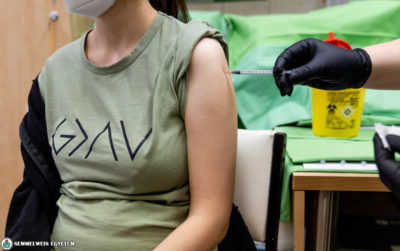Dr. Ferenc Bánhidy, Vice-Rector for General Affairs, Deputy Director of the Department of Obstetrics and Gynecology, held a presentation on the benefits of vaccination, highlighting the positive effects of vaccination on pregnant women. The aim of the event organized by András Pető Faculty was to enable students and employees to provide parents with information from authentic sources. Participants also had the opportunity to ask questions from the presenter.
 In his presentation, Dr. Ferenc Bánhidy, Vice-Rector for General Affairs drew attention to the fact that the coronavirus is also dangerous for pregnant women. He recalled that during the first wave there were no pregnant patients at the university departments, however in the second wave 38 expectant mothers needed treatment. In the third wave, more than 90 pregnant patients had to be treated, out of whom 25 patients needed a ventilator, and in several cases ECMO treatment was also required. The vice-rector emphasized that although the coronavirus does not enter into the body of the fetus, the mother’s poor health condition may even lead to miscarriage.
In his presentation, Dr. Ferenc Bánhidy, Vice-Rector for General Affairs drew attention to the fact that the coronavirus is also dangerous for pregnant women. He recalled that during the first wave there were no pregnant patients at the university departments, however in the second wave 38 expectant mothers needed treatment. In the third wave, more than 90 pregnant patients had to be treated, out of whom 25 patients needed a ventilator, and in several cases ECMO treatment was also required. The vice-rector emphasized that although the coronavirus does not enter into the body of the fetus, the mother’s poor health condition may even lead to miscarriage.
“If the virus attacks the expectant mother’s lungs, it will also have an effect on the child’s development. It is important, therefore, that the vaccine is much more beneficial than the potential risk of the virus. Taking these factors as well as the results of international research into account, it is reasonable to vaccinate pregnant women out of turn. That is why their vaccination started at the university immediately after the announcement of Dr. Cecília Müller, Chief Medical Officer at the end of March”, Dr. Ferenc Bánhidy said.
Hungary was the fifth country to start vaccinating pregnant women, which is important because it can save two lives at the same time, as the children of mothers who have received the vaccine will also be protected against the coronavirus. International studies have also shown that an extremely high number of antibodies are produced in the body of pregnant women even after the administration of the first shot.
“Spontaneous miscarriages are not uncommon before the 12th week of pregnancy, which is why expectant mothers are only allowed to receive their first shot in the second trimester. Based on recent international and national professional experiences and opinions, the second jab can also be administered before the 36th week of the pregnancy, thus providing full protection. For those who are planning to have children, it is recommended to have themselves vaccinated, as it will not have any negative impact on the planned pregnancy”, said Dr. Ferenc Bánhidy.
 He also talked about the dangers of fake news, and highlighted that they deter a lot of people who as a result, do not have themselves vaccinated. He also emphasized the importance of setting a good example as parents, as we can only be credible if we ourselves believe in what we communicate.
He also talked about the dangers of fake news, and highlighted that they deter a lot of people who as a result, do not have themselves vaccinated. He also emphasized the importance of setting a good example as parents, as we can only be credible if we ourselves believe in what we communicate.
“We need to set an example for our children by having ourselves vaccinated as parents, which is currently the most effective way to stop the epidemic”, the Vice-Rector added.
Bernadett Bódi
Featured image (illustration): Attila Kovács – Semmelweis University
Translation: Katalin Illés-Romhányi


